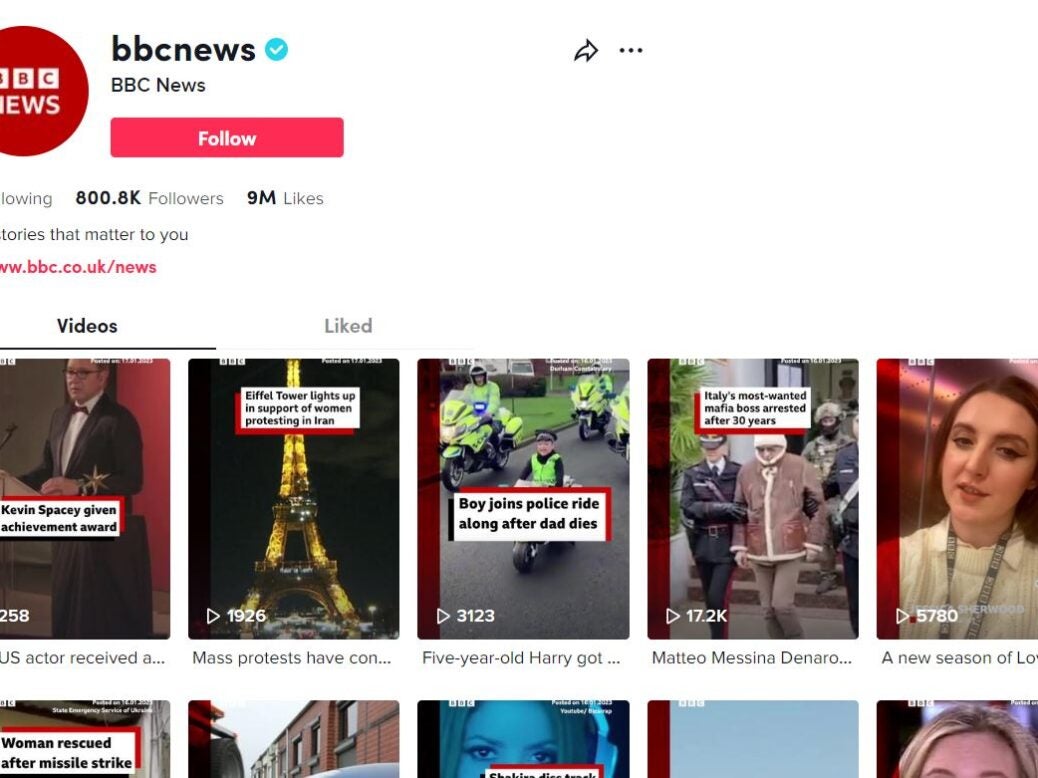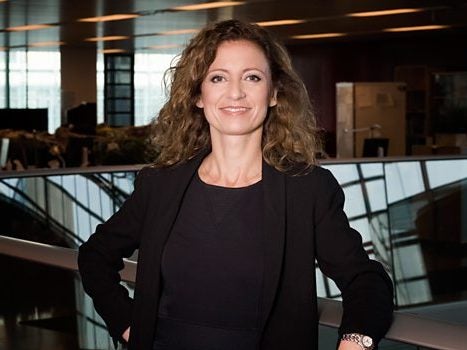
Tiktok has gone from being a neglected platform for BBC News to one of its “main priorities” for 2023 in less than a year.
This month BBC News advertised for four journalists on 12-month contracts to join a new Tiktok team as part of its wider social news team.
The advert stated: “Growing the BBC News Tiktok account to make it the biggest and best, both globally and in the UK, is one of News’ main priorities for 2023.”
This comes after a year of rapid change for BBC News on the platform. In January 2022, two BBC News social and digital bosses told Press Gazette the broadcaster had stayed off Tiktok because they did not have the resources to create bespoke content properly – and it would not be true to the BBC brand to do “light news”.
However, by March after Russia invaded Ukraine, the broadcaster realised there was an opportunity to combat disinformation about the war. At this point, it had also seen other major news brands such as Sky News begin to see “rapid growth” with their experiments on Tiktok.
Speaking this week, Naja Nielsen, director of digital and channels at BBC News, told Press Gazette the increase in disinformation meant there had become a “real public service reason for us to be there”.
She said: “We choose the platforms that we think will help us the most in informing everyone, delivering public value, making sure that there is trustworthy, transparent, accurate, impartial information out there.”
Of the expansion, she added: “It is a choice because there are so many things you could do in any media organisation and we think we need a slightly bigger team so that we can both keep up publishing but also experiment with new formats and keep learning.”
The BBC News Tiktok account has been the fastest-growing of all major UK and US news brands on Tiktok since it launched in March 2022, according to data shared with Press Gazette covering May to January, reaching more than 802,000 followers in ten months – although it remains behind the likes of Sky News (3.3 million followers) and ITV News (1.5 million) in the UK and NBC News (4 million) and CNN (1.3 million) in the US.
Nielsen said the follower number is not seen as a priority at BBC News – instead they are more interested in the number of views each video gets.
“We’re interested in learning from the storytelling that we see there and how the algorithm works because it’s very different from other platforms,” she said. “We are looking at the number of views we get to particular pieces of content and we’ve been very pleased to see how some of our, you can almost call it really hard or public service content, has got millions and millions and millions of views.”
Some of its top videos so far include coverage of the Queen’s death, an explanation of why Liz Truss was stepping down as prime minister after 45 days, as well as explanations of the dangers of vaping, what a recession is, and a horrific murder case.
Tiktok is known for its addictive quality, serving people AI-recommended videos on their "For You" page. The way it works means accounts with smaller followings can quickly get traction with content that is deemed to be performing well by the algorithm.
One challenge with this for public service news providers is that it "will give people more of what they want and maybe less of what they need," Nielsen said. "But I'm not sure that it's worse on Tiktok than on other platforms so that's also one of the reasons why we are so focused on growing our own platforms as well."
She said all news publishers are in danger of only managing to reach their existing audiences on third-party platforms. But BBC News on Instagram is reaching a younger and more female-skewed audience, "that aren’t your heavy news users".
Tiktok, however, does not make detailed analytics available. Nielsen said: "We are not alone in telling Tiktok we would like higher quality data... for us and for every other journalist and other publisher right now, access to real data about people – who is doing what - is kind of the key to development and innovation.
"You really need to know who your audiences are. The higher quality data we can get, the better we can make our journalism."

Another problem posed by investment into Tiktok is its Chinese ownership and security issues. Last month, Tiktok admitted it used the app to spy on journalists in an attempt to track down their sources and BBC journalists have reportedly internally raised concerns over this. Meanwhile, the UK Parliament closed its Tiktok account after just a week in August over concerns that data could be passed to the Chinese Communist Party, and the app has been banned from US government phones.
Nielsen said: "We are monitoring everything and we remain independent and free to report impartially on whatever platform so that is very important. And because of BBC News’ nature, we are publishing in English and 41 other languages and we are publishing in Russia, we publish in Iran, Afghanistan, we are publishing in a lot of territories where there is a risk connected to publishing."
She added: "I think other media is doing the same thing with Tiktok right now. The Government might make some choices about what is the right thing for them to do. For us, it has to do with making sure that there is trustworthy information where people are."
Nielsen also addressed BBC News' hesitation in joining Tiktok. The BBC already ran an account sharing clips from its entertainment programming, which had 1.1 million followers in January 2022 and 3.9 million now.
She said that before the war in Ukraine, BBC News saw Tiktok as a "really interesting entertainment platform" and they were "a little in doubt about how it would work for news". However, she said they watched as it "became more and more a platform that people also used for news" and said they were also "inspired" by young BBC journalists who experimented with the platform, likely meaning Sophia Smith Galer and Emma Bentley who have joined Vice World News and The News Movement respectively following the broadcaster's hesitation.
In general, BBC News videos on Tiktok now fall into one of three categories: content adapted from one of the news organisation's other platforms, bespoke content created especially for the platform, and live streams such as the successful footage from outside the Queen's funeral (they could not show inside Westminster Abbey on Tiktok due to the licensing agreement).
At the Society of Editors conference in May last year, Nielsen said she was not sure BBC News had "cracked" how to do Tiktok yet.
Asked this week if they have now, Nielsen said BBC News and other media companies are all "still learning" – especially because of the unpredictable nature of the Tiktok algorithm.
"I would say we're doing well and I'm really pleased with what we do," she said. "We've got to put more investment into it. But I'm not saying we or any other journalist have really cracked it."
She added that it is "very dangerous for media organisations to be copying each other too much – we could all be competing with each other doing the same wrong thing". Instead, she said, media brands like BBC News can learn a lot from the methods of young Tiktok natives – with the platform bringing a new type of storytelling and creativity in the same way that YouTube and Instagram have previously.
"I’m looking out for what influencers and younger users but also what other media and other brands are doing. Everything can be inspiring," she said.
The team is also still learning the magic unique to Tiktok that is equivalent to them building the biggest news Instagram account in the world – on that platform, it was by adding context to stories and explaining them simply, Nielsen said.
"I hope that the next year’s investment will teach us what it is that is providing that extra editorial value to the users of Tiktok," Nielsen said.
"I really hope that a year from now we’ve got a high level of understanding of how we can publish really great journalism efficiently to the very young target group… that might not get news from a lot of more traditional sources."
For now, other platforms like Facebook and Instagram "all remain very important", Nielsen said, although Tiktok is "growing in importance". But she pointed out that Tiktok's growth took place so rapidly that we may be talking about investment in another new platform in one year's time.
BBC News' main objective, however, remains to promote its journalism and its own website and app: "The most important thing for us in all is to grow our own digital platforms and to grow the number of people that are finding them so we can give them the highest quality editorial service there is in the UK," Nielsen said.
Email pged@pressgazette.co.uk to point out mistakes, provide story tips or send in a letter for publication on our "Letters Page" blog
